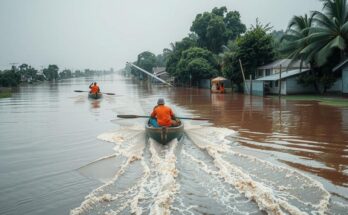The overflowing Nile River is causing severe flooding in South Sudan, displacing over 379,000 people, destroying farmland, and killing livestock, leading to a humanitarian crisis. The area, particularly impacted, lacks basic infrastructure and relies heavily on humanitarian aid. Efforts to manage flooding are failing, and the situation is worsened by economic challenges and ongoing conflicts.
The overflowing Nile River has exacerbated flooding in South Sudan, displacing over 379,000 individuals and submerging rural villages, farmlands, and livestock. For many, like Bichiok Hoth Chuiny, this marks the first flight from home. Decades of increasing floodwaters have transformed the landscape into such a perilous environment that pastoral communities are ceasing traditional agricultural and livestock-keeping practices. The situation is starkly underscored by support from humanitarian organizations, which are now the main lifeline for those displaced. Conditions remain dire, as community infrastructure is largely collapsed, with many relying on dwindling international aid.
South Sudan, independent since 2011, has faced continuous instability due to civil conflict since 2013. Coupled with environmental vulnerability due to climate change impacts, this makes the population particularly susceptible to the effects of seasonal flooding. The Nile River inundation, worsened by dam operations in Uganda, highlights the ongoing crises within the nation, emphasizing the urgent need for substantial assistance and robust governmental response to the humanitarian disaster escalated by flooding and underdevelopment.
The inundation of the Nile River has provided severe challenges to South Sudan’s communities, leading to a humanitarian crisis with thousands displaced and reliant on limited aid. As flooding worsens annually and environmental conditions deteriorate, it becomes increasingly critical for the international community to augment its support to alleviate suffering and foster the resilience of affected populations. The lived experiences of individuals like Nyabuot Reat Kuor and Peter Kuach Gatchang illustrate the urgent need for immediate and effective intervention.
Original Source: www.independent.co.uk




